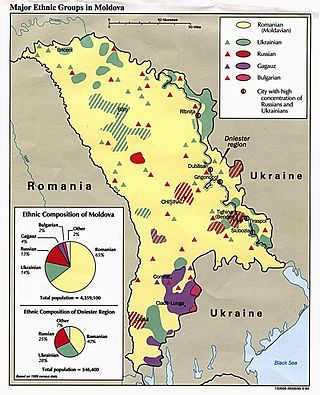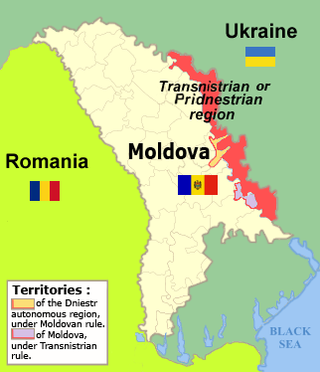Related Research Articles

Transnistria, officially the Pridnestrovian Moldavian Republic (PMR), is an unrecognised breakaway state that is internationally recognised as a part of Moldova. Transnistria controls most of the narrow strip of land between the Dniester river and the Moldovan–Ukrainian border, as well as some land on the other side of the river's bank. Its capital and largest city is Tiraspol. Transnistria has been recognised only by three other unrecognised or partially recognised breakaway states: Abkhazia, Artsakh and South Ossetia. Transnistria is officially designated by the Republic of Moldova as the Administrative-Territorial Units of the Left Bank of the Dniester or as Stînga Nistrului. The Council of Europe considers the territory to be under military occupation by Russia.

According to the Moldovan law on territorial administrative organisation, Moldova is divided administratively into the following administrative territorial units: districts, cities/towns and villages. The administrative territorial organization of Moldova is made on 2 levels:
- villages (communes), sectors and cities/towns (municipii) constitute the first level,

FC Tiraspol was a Moldovan football club based in Tiraspol, Moldova. They played in the Divizia Naţională, the top division in Moldovan football.

Ilie Ilașcu is a Moldovan-born Romanian politician, especially known for being sentenced to death by the separatist Transnistrian government for alleged involvement in two murders and for actions which have been described as Moldovan state-sponsored terrorism by Transnistrian government officials.
Andrei Ivanțoc is a Moldovan politician. He was among the four leaders of the Tiraspol branch of the pro-Romanian Christian-Democratic People's Party of Moldova who were accused of terrorism by the authorities of the breakaway Pridnestrovian Moldavian Republic (PMR).

The Transnistria War was an armed conflict that broke out on 2 November 1990 in Dubăsari between pro-Transnistria forces, including the Transnistrian Republican Guard, militia and neo-Cossack units, and pro-Moldovan forces, including Moldovan troops and police.

This is the history of Transnistria, officially the Pridnestrovian Moldavian Republic (PMR), is an unrecognised breakaway state that is internationally recognised as part of Moldova. Transnistria controls most of the narrow strip of land between the Dniester river and the Moldovan–Ukrainian border, as well as some land on the other side of the river's bank. See also the history of Europe.
The 1997 Moscow memorandum, also known as the Primakov memorandum, was an agreement governing relations between Moldova and Transnistria aimed at solving the Transnistria conflict.

The Romanian-language schools in Transnistria are subject to limitations by the government of Transnistria, an unrecognized breakaway region of Moldova since 1992.

The state of affairs with human rights in Transnistria has been criticized by several governments and international organizations. The Republic of Moldova, and other states and non-governmental organizations (NGOs) claim that the government of Transnistria is authoritarian and has a record of arbitrary arrest and torture.

Currently, the Russian Federation holds an unknown number of soldiers in Transnistria, an unrecognized breakaway state internationally recognized as part of Moldova. This Russian military presence dates back to 1992, when the 14th Guards Army intervened in the Transnistria War in support of the Transnistrian separatist forces. Following the end of the war, which ended in a Russian-backed Transnistrian victory and in the de facto independence of the region, the Russian forces stayed in a purportedly peacekeeping mission and reorganized in 1995 into the Operational Group of Russian Forces (OGRF), currently guarding the Cobasna ammunition depot. Some other Russian soldiers also participate in the Joint Control Commission between Moldova, Russia and Transnistria since 1992. Today, the Government of Moldova views the presence of Russian troops in Moldova as illegitimate and has called for their withdrawal and replacement by international forces. Russia however has opposed this. On 15 March 2022, the Parliamentary Assembly of the Council of Europe recognized Transnistria as a Moldovan territory occupied by Russia.
The mass media of Transnistria, the breakaway territory within the borders of Moldova, features both state-owned or supported outlets and opposition media. Publications are in Russian, with a single newspaper in each of the other two official languages, Moldovan (Romanian), and Ukrainian.

The Pridnestrovian Moldavian Soviet Socialist Republic (PMSSR), also commonly known as Soviet Transnistria or simply known as Transnistria, was created on the eastern periphery of the Moldavian Soviet Socialist Republic (MSSR) in 1990 by pro-Soviet separatists who hoped to remain within the Soviet Union when it became clear that the MSSR would achieve independence from the USSR and possibly unite with Romania. The PMSSR was never recognised as a Soviet republic by the authorities in either Moscow or Chișinău. In 1991, the Pridnestrovian Moldavian Republic succeeded the Pridnestrovian Moldavian Soviet Socialist Republic.

Crime in Transnistria covers criminality-related incidents in the breakaway Republic of Transnistria, still nominally part of Moldova. The police organisations of Transnistria are tasked with fighting crime in the republic.

This timeline of events is a chronological list of incidents and other notable occurrences related to the War of Transnistria, including events leading up to the war.

Law enforcement in Transnistria is administered by the region's own police force. Transnistria functions as a presidential republic, with its own government, parliament, military, paramilitary and police (militsiya) force, constitution, currency, postal system and stamps, flag, national anthem, and coat of arms.
Ernest Vardanean is a journalist and political scientist who lives in the breakaway Moldovan region of Transnistria. He was arrested on 7 April 2010 by the self-proclaimed forces in Tiraspol charged of high treason in favor of the Republic of Moldova.
The 2012 Moldova security zone incident happened in the Transnistrian security zone maintained by the Joint Control Commission on the territory of the Republic of Moldova. On 1 January, a Moldovan civilian drove through a checkpoint in the zone and was fatally wounded by a Russian soldier.

Moldova–Transnistria relations are the political and economic relations between the Republic of Moldova and Transnistria, an unrecognized state between the Dniester River and Ukraine. During the dissolution of the Soviet Union, political tensions in the Moldavian Soviet Socialist Republic led to Transnistria declaring independence from Moldova, culminating in the Transnistrian War of 1992. As part of the ceasefire agreement ending the war, a Joint Control Commission composed of Moldovan, Transnistrian, and Russian forces was established to supervise the demilitarized zone which was located in the Transnistrian region. The Joint Control Commission still supervises the zone, and negotiations to resolve the dispute are ongoing. The negotiations are supported by the Russian Federation, Ukraine, the United States, the European Union, and the Organization for Security and Co-operation in Europe (OSCE).
The so-called Berlin Plus package is the name given to a series of eight points that were agreed to be implemented in a protocol signed in 2016 during a meeting of the 5+2 format that took place on that year in Berlin, Germany, to improve the situation of the Transnistria conflict between Moldova and the unrecognized breakaway state of Transnistria. These eight points, which had been under negotiation since 2012, are the following:
References
- ↑ Promo-LEX expresses concern at the increasingly dramatic situation of the two political prisoners - Ilie Cazac and Ernest Vardanean [ permanent dead link ]
- ↑ "Ilie Cazac is free!". Archived from the original on 2013-01-19. Retrieved 2012-01-30.
- ↑ The European Partnership Fair for Civil Society Organization in Moldova took place in Chisinau
- ↑ World Organization Against Torture, Moldova, Republic of: Follow-up of case MDA 210411_Mr. Ilie Cazac released from detention
- ↑ "Moldova: Parents of Ilie Cazac demand a Russian intervention for their son's release". Archived from the original on 2012-07-22. Retrieved 2012-01-30.
- ↑ "The parents of Ilie Cazac risk entering a coma". Archived from the original on 2012-07-18. Retrieved 2012-01-30.
- ↑ "Ilie Cazac's parents will stop, for the moment, the hunger strike". Archived from the original on 2012-07-30. Retrieved 2012-01-30.
- ↑ "Moldovan deputy premier seeks foreign partners support to release journalist sentenced in Transnistria". Archived from the original on 2010-12-24. Retrieved 2012-01-30.
- ↑ "Ilie Cazac is free!". Archived from the original on 2013-01-19. Retrieved 2012-01-30.
- ↑ World Organization Against Torture, Moldova, Republic of: Follow-up of case MDA 210411_Mr. Ilie Cazac released from detention
- ↑ "Ilie Cazac is free!". Archived from the original on 2013-01-19. Retrieved 2012-01-30.
- ↑ Moldovan Jailed In Transdniester For Spying Won't Change Plea To Get Pardon
- ↑ Ilie Cazac was set free [ permanent dead link ]
- ↑ "Prime Minister Vlad Filat today held a meeting with a tax inspector of the Tighina Fiscal Inspectorate, Ilie Cazac, who had been unlawfully arrested by the state security ministry of the breakaway Transnistrian republic". Archived from the original on 2012-07-12. Retrieved 2012-01-30.
- ↑ "Moldovan premier meets UN High Commissioner for Human Rights". Archived from the original on 2013-06-03. Retrieved 2012-01-30.